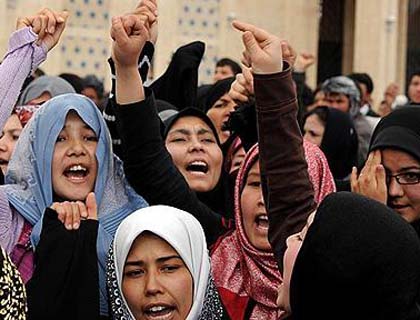Since 2001, Afghan women have come a long way in terms of achieving their rights and freedom. During Taliban they had no right to get education and walk out without a close companion. Now more than thirty percent of school children are girls. There are tens thousands of girls who are following their higher education in or outside of the country who if protected by government would play enormous role for bringing fundamental changes. During Taliban they were banned to work outside but fortunately around thirty percent of members of the lower house of the parliament, the highest legislative body, are women. It is really an exceptional case if there is a company, factory, enterprise or NGO that has no woman employee, which looks outstanding considering women employment only a decade ago.
Moreover, job opportunities for educated females seem to be better than males. The number of boys with certificate of higher education, seeking jobs as well as the duration they spend to get jobs is far larger than that of girls. I know tens of boys with bachelor degrees have searched for a year or more but while girls with the similar educational background and proficiency got employed within months. Looking to job advertiser websites, under the visible number of announced job vacancies are written in bold lines that “women are highly appreciated to apply”. That is mainly because many organizations try to bring the so-called gender balance.
This is somehow better opportunity on one hand and huge enthusiasm to follow their education on other have given way to a new class of women who are economically dependent on their fathers, brothers or husbands. They are far independent. They can live without any family financial supporters unlike the cliché Afghan women. Many of them indeed run their families and some are the only bread winners.
This phenomenon has led to a determination of new role or relation with family and relatives for this small class of women. They have different expectations with their new role in their families. So, if the process continues, we would witness a ground social change.
But as far as it concerns now, despite all the above achievements, the traditional values have still the women rights and freedom in their paws. I have been always worried that something is going wrong at the very lower layers of the society. King Amanullah Khan who is still revered and he is known as Ghazi (a person who hold Jihad but is not martyred) and who started democratization of the country a century ago failed to change the society. He was ousted by a limp Mullah blaming him of ruining the Islamic values. Since then several times, regimes, organizations and individuals have tried to open up the Afghan society, but all doomed to the same destiny of King Amanullah.
Till now several reasons have been provided by different analysts for such failures. In case of King Amanullah everyone talks about his hasty move. It is alleged that he suddenly announced full freedom for women and even banned Hejab for government employees and government funded organizations. Such a move left deep scare on the religious feelings of common people who thought that their King who should otherwise be the substitute of Prophet Mohammad (PBUH) wanted to spoil their religious believes. Following governments, particularly after announcement of Republic system by President Daud Khan and subsequent communist governments to some extent tried to revive the tradition of King Amanullah but yielded no fruits. Though during their power, women had far larger freedom and their rights but later on civil war and emergence of Emarat-e-Islamic showed that deep down the layers of the society something remained unchanged. Something resisted and perhaps made cancerous development which finally paved the way for barbaric regime of Taliban. This issue should be taken seriously. The history shows that we often went from the very same way from which our ancestors had gone but reached deadlocks. It should be always considered that if former regimes failed to bring ground change, there is no guarantee that the current or the upcoming ones succeed.
So, I think along with the above reason mentioned and numbers of others that we can find in books written by social and political experts, there is one thing that I think played key role in such failures and if not considered would do the same. That is nothing except the invincible fronts of religious misinterpretation. First of all, generally all believe that those who follow religious studies in Madressahs understand and aware of religious issues than anyone else irrespective of their level of education. Large population for any religious issue merely listen to village Mullah who really do not have any professional knowledge of religion. And unfortunately those who studied in neighboring countries have just focused on Islamic Jurisprudence that also from very conservative interpretation. Those who studied in Pakistan generally bear the mark of Dawbandi school of thought with deep effects of Mawdudi political Islam. And Shiites who studied in Iran also affected by conservative current of Islamic Republic which introduces Shia as an ideology. Unfortunately, due to unknown reasons, no role has been considered for women in the political Islam however they were motivated to take part for pushing the currents toward victory.
So, the political Islam is generally moved in opposition to modern values, by heralding an Islamic utopia which practically led to hell as observed in the form of Taliban regime in Afghanistan. From this prospective, anything which support the modern values, including human rights and women rights stand against Islamic values.

